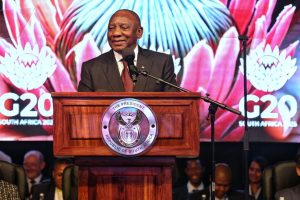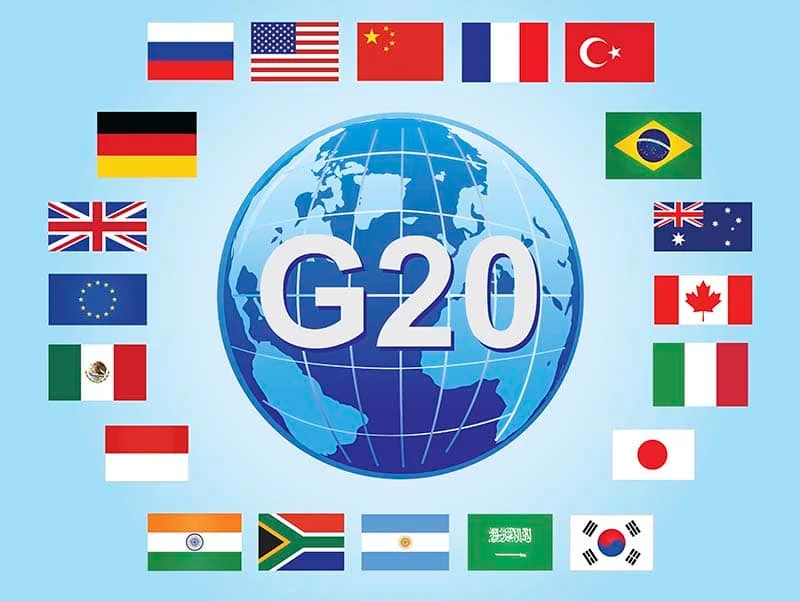By Nomonde Mafu
The G20 has zoomed its lenses on the climate crisis! Among other multiple challenges which are deemed to challenge Africa’s development- South African President Cyril Ramaphosa has highlighted climate change during the G20 Foreign Ministers’ Meeting in Johannesburg, South Africa this week.
Worth noting is that South Africa is the current chair of the G20- making President Ramaphosa the chairperson.
The G20, or Group of Twenty, is an international forum made up of 19 countries plus the European Union (EU), representing the world’s major economies.
It was established in 1999 to bring together leaders, finance ministers, and central bank governors to discuss and coordinate global economic issues, though its scope has since expanded to include topics like climate change, health, and sustainable development.
The members are Argentina, Australia, Brazil, Canada, China, France, Germany, India, Indonesia, Italy, Japan, Mexico, Russia, Saudi Arabia, South Africa, South Korea, Turkey, the United Kingdom, the United States, and the EU.
RELATED: EU, ITC expands market access for local MSMEs at EITF 2024
Together, they account for about 85 per cent of global GDP, 75 per cent of international trade, and two-thirds of the world’s population, making the G20 a pretty big deal when it comes to shaping global policies.
In his address, the South African President said that Africa was home to some of the world’s fastest-growing economies and faced unique challenges, such as the impacts of climate change, development needs and the effects of global trade dynamics.
“The Summit’s location underscores the need for African voices to be heard on critical global issues, like sustainable development, the digital economy and the shift toward green energy.
It is a great opportunity to promote greater collaboration between African nations and the rest of the world.
“Geopolitical tensions, rising intolerance, conflict and war, climate change, pandemics and energy and food insecurity threaten an already fragile global coexistence.
These challenges are interconnected. They require responses that are inclusive and coordinated.
“Yet there is a lack of consensus among major powers, including in the G20, on how to respond to these issues of global significance.

Extreme poverty and growing inequality within and among nations weigh heavily on the conscience of the world. We are just five years away from 2030, the deadline for achieving the Sustainable Development Goals,” said the President.
The G20 Chairman went on to say that as the international community, they committed themselves to this ambitious agenda to end poverty and hunger, to protect the planet, to achieve gender equality, universal education and health coverage, and to promote decent work and sustainable economic growth.
“Our commitment to achieve these targets we must not waver. The nations of the world look to the G20 for leadership on the most pressing issues confronting our world.
Just as cooperation supported the progress of early humans, our modern-day challenges can only be resolved through collaboration, partnership and solidarity.
“That is why South Africa has placed solidarity, equality and sustainability at the centre of our G20 Presidency. We would like our G20 Presidency to be one in which all voices are heard and in which all views count. The G20 represents over two-thirds of the world’s population.
“Its decisions and policies must reflect the needs and aspirations of all who form part of the G20 family. The G20 must also seek to reflect the needs and aspirations of all people who call this planet home. This year marks 80 years since the United Nations was founded and the UN Charter was adopted,” he said.
The President then emphasised that the climate crisis was no longer a threat- but a catastrophic reality, highlighting that last year, the global average temperature exceeded 1.5 degrees Celsius above pre-industrial levels for the first time.
RELATED: Applications open for EU-ITC Future Leader Icons Launchpad
“The impact of climate change places a disproportionate and unjust burden on the poorest and most vulnerable. As the G20, we must seize this moment of crisis to innovate and drive sustainable solutions. We must remain true to the original G20 mandate of promoting strong, sustainable, balanced and inclusive growth.
“In line with this mandate, South Africa has identified four priorities for its G20 Presidency. Firstly, we should take action to strengthen disaster resilience and response.
Climate-induced natural disasters affect countries around the world. But they have a particularly devastating impact on countries that cannot afford the costs of recovery and rebuilding. We will call on G20 Leaders to urge the global community, including international financial institutions, development banks and the private sector, to scale up post-disaster reconstruction (verbatim).”
Addressing the climate crisis, he further urged G20 Leaders to secure agreement on increasing the quality and quantity of climate finance flows to developing economy countries.
“This includes strengthening multilateral development banks, enhancing and streamlining support for country platforms such as the Just Energy Transition Partnership, and leveraging private capital more effectively. Fourthly, we will seek to harness critical minerals for inclusive growth and sustainable development.
“We will champion an inclusive G20 framework on green industrialisation and investment to promote value addition and beneficiation of critical minerals.
South Africa will seek to take forward the recommendations of the 2024 report of the UN Secretary-General’s Panel on Critical Energy Transition Minerals.”
Worth noting is that the President’s address came at a time when South Africa is faced with torrential rainfalls which are taking lives and destroying infrastructure.
